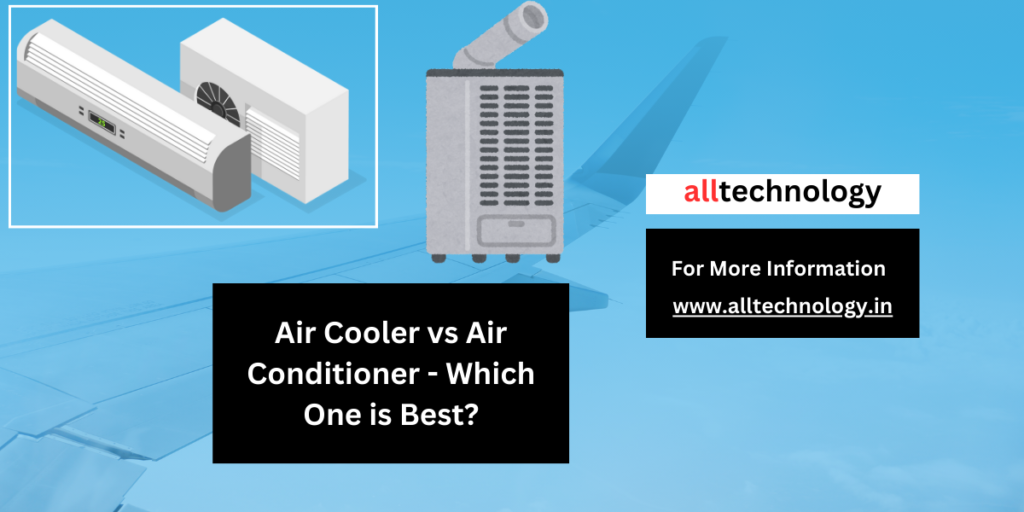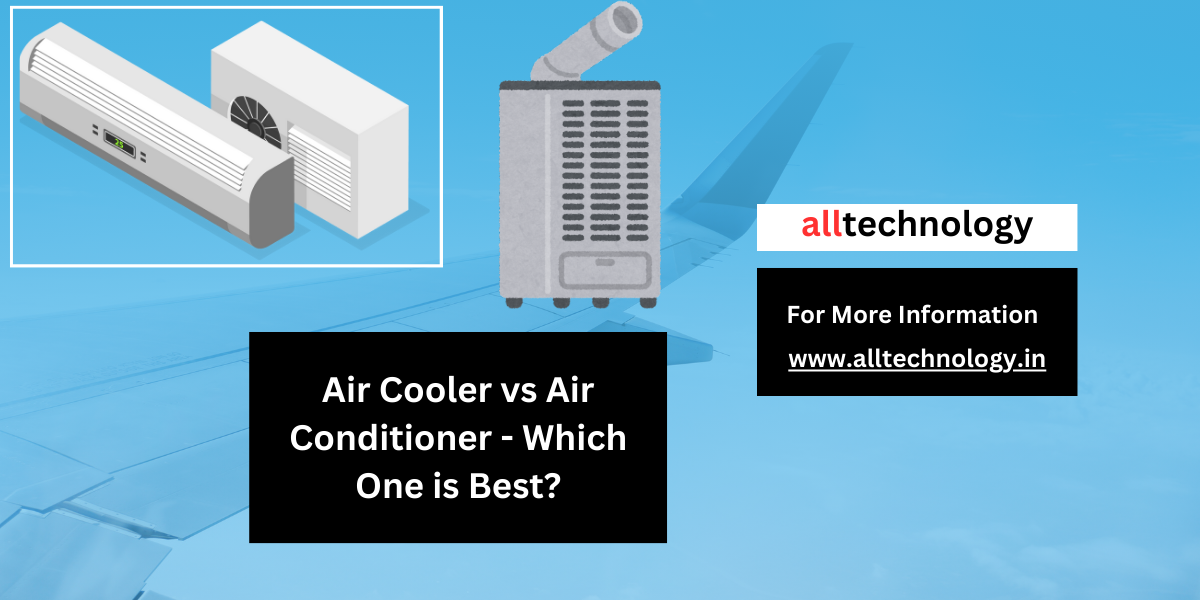Introduction
Hello Bloggers welcome alltechnology blog. In this blog you will learn Air Cooler vs Air Conditioner – Which One is Best? In the sweltering heat of summer, staying cool becomes a paramount concern. Two popular options often come to mind: air coolers and air conditioners. Both have their merits, but choosing the right one depends on various factors such as budget, room size, environmental impact, and personal preferences. Let’s delve into the intricate world of cooling solutions and uncover which one might be the best fit for you.

Air Cooler vs Air Conditioner – Which One is Best?
When the sweltering heat of summer arrives, finding the perfect cooling solution becomes paramount. Among the plethora of options, two devices reign supreme: air coolers and air conditioners. But which one is truly the best for your needs? Let’s delve into the intricacies and nuances of these cooling titans.
Understanding the Basics
Air Coolers: An air cooler, often termed an evaporative cooler, operates on a simple yet effective principle: evaporation. Water is pumped over cooling pads, and as warm air passes through these pads, it loses its heat through evaporation, resulting in cooler air. The process is natural, energy-efficient, and eco-friendly.
Air Conditioners: Air conditioners, in contrast, use a more complex mechanism involving refrigerants and compressors. They draw warm air from the room, cool it using a refrigerant cycle, and then circulate the chilled air back into the room. This method is powerful and capable of maintaining precise temperature control.
Cost and Energy Efficiency
When it comes to cost, air coolers have the upper hand. They are significantly cheaper to purchase and operate, consuming up to 75% less energy than air conditioners. This makes them an attractive option for budget-conscious consumers and those looking to reduce their environmental footprint.
On the other hand, air conditioners, while more expensive, offer unparalleled cooling efficiency. They can cool a room much faster and maintain a consistent temperature, which is particularly beneficial in extremely hot climates or for individuals sensitive to heat.
Environmental Impact
Air coolers score high on the eco-friendly scale. They use water instead of refrigerants, which can be harmful to the environment. Additionally, their lower energy consumption means reduced greenhouse gas emissions. However, they do require a constant water supply and are less effective in humid conditions.
Air conditioners, although more energy-intensive and reliant on refrigerants, have seen advancements in technology aimed at reducing their environmental impact. Modern units are more energy-efficient and use refrigerants with a lower global warming potential (GWP). Yet, their higher energy consumption still poses an environmental challenge.
Performance and Comfort
The performance of these devices can vary significantly based on the environment. Air coolers are ideal for dry, arid regions where humidity levels are low. They add moisture to the air, providing a cooling effect that is both refreshing and comfortable. However, in humid climates, their effectiveness diminishes, and they can make the air feel sticky and uncomfortable.
Air conditioners, by contrast, excel in both dry and humid environments. They remove excess moisture from the air, making them perfect for areas with high humidity. Their ability to provide consistent, controlled cooling ensures maximum comfort regardless of external conditions.
Maintenance and Longevity
Maintenance is another critical factor. Air coolers are generally easier and cheaper to maintain. Regular cleaning of the cooling pads and refilling the water tank are the primary tasks required to keep them running smoothly. Their simpler design also means fewer parts that can malfunction.
Air conditioners require more rigorous maintenance, including regular servicing of the filters, coils, and fins. The complexity of their systems means potential higher costs for repairs and parts. However, with proper maintenance, they tend to have a longer lifespan and can provide reliable cooling for many years.
Cost Implications: Initial and Operational
Initial Investment
Air coolers are generally more affordable upfront compared to air conditioners. They require a lower initial investment, which makes them accessible to a wider range of consumers. This affordability extends to maintenance costs as well, with simpler components that are easier and cheaper to service or replace.
Operational Costs
While air coolers are kinder to your wallet in terms of electricity usage, air conditioners, with their higher efficiency in extreme conditions, might be worth the extra expense for those who prioritize comfort and precise climate control. The operational cost of running an air conditioner can be significantly higher, especially in areas with high electricity rates or where the unit needs to run continuously to combat extreme heat.
Environmental Impact: Sustainability Matters
Air Coolers: Green and Clean
Air coolers are inherently more sustainable due to their lower energy consumption and reliance on natural processes. They do not use harmful refrigerants, which makes them a more environmentally friendly option. This is a crucial factor for eco-conscious consumers looking to reduce their carbon footprint.
Air Conditioners: Efficiency vs. Emissions
Despite their efficiency, air conditioners pose environmental concerns. The refrigerants used, if not properly managed, can contribute to greenhouse gas emissions. Furthermore, their higher electricity demand often translates to increased fossil fuel consumption unless renewable energy sources are utilized.
Comfort and Usability: What Suits Your Lifestyle?
Personal Preferences and Needs
Your choice between an air cooler and an air conditioner should also consider personal preferences and specific needs. For instance, air coolers add moisture to the air, which can be a boon in dry climates but a bane in already humid environments. Conversely, air conditioners, with their dehumidifying effect, might be perfect for muggy climates but could contribute to dryness and discomfort in already arid regions.
Installation and Portability
Air coolers are typically portable and easy to install, often requiring no more than a power outlet and a water source. This makes them ideal for renters or those who need a flexible cooling solution. Air conditioners, particularly central or split systems, often require professional installation and can be more permanent fixtures, which might not be suitable for every living situation.
Conclusion
Deciding between an air cooler and an air conditioner ultimately hinges on your specific needs and circumstances. If you’re looking for an affordable, eco-friendly solution and live in a dry climate, an air cooler could be the best choice. Its simplicity, cost-effectiveness, and lower environmental impact are significant advantages.
FAQ
Question 1. Which is better air cooler or AC?
If you have a large space in a humid climate, an air conditioner is likely the best option. Air conditioners have a higher cooling capacity and can effectively cool larger spaces. They are also better equipped to handle high humidity levels, which can be important in areas with muggy summers.
Question 2. Is cooler better than AC for electricity bill?
Air coolers consume up to 10 times less energy than ACs. They consume less electricity and can also work in low voltage areas. Monthly electricity / power bills are significantly lower.
